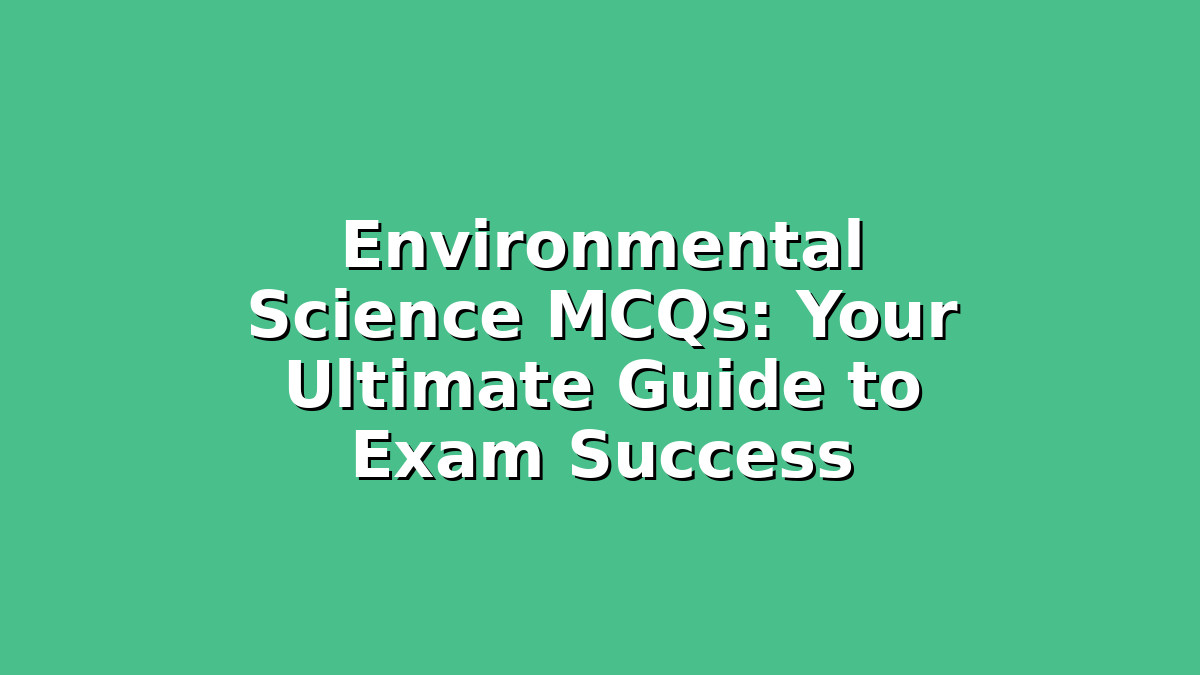Preparing for exams can be a stressful experience, especially when it comes to subjects like Environmental Science that cover a wide range of topics. One effective way to master the subject and boost your confidence is by practicing multiple-choice questions (MCQs). Environmental Science MCQs not only test your knowledge but also help you develop quick thinking and exam-taking strategies. In this comprehensive guide, we’ll explore helpful study tips, how to approach Environmental Science MCQs, and resources you can use to maximize your preparation.
Understanding the Importance of Environmental Science MCQs
Before diving into study techniques, it’s essential to understand why MCQs are a popular question format in exams. MCQs allow examiners to assess a wide breadth of knowledge efficiently. For students, they provide instant feedback on what topics are well understood and which need more review. Environmental Science, being an interdisciplinary subject, covers areas such as ecology, pollution, biodiversity, climate change, and sustainable development. By practicing MCQs regularly, students can reinforce key concepts and identify knowledge gaps.
Section 1: How to Effectively Study Environmental Science for MCQs
The foundation of excelling in Environmental Science MCQs lies in a solid understanding of the subject matter. Here’s how you can build that foundation:
1. Use a Structured Study Plan
Start by dividing the syllabus into manageable topics such as ecosystems, renewable resources, environmental policies, and more. Allocate specific times to each topic and create weekly goals. A structured approach prevents last-minute cramming and promotes better retention.
2. Focus on Core Concepts
Environmental Science is concept-heavy. Instead of trying to memorize everything, focus on understanding core ideas like the water cycle, energy flow in ecosystems, causes and effects of pollution, and the principles of conservation. This conceptual clarity will help you answer MCQs that often test application rather than rote memorization.
3. Make Use of Visual Aids
Charts, diagrams, and flowcharts are excellent tools for visual learners. For example, a flowchart of the nitrogen cycle can help you remember each step more effectively than text alone. Use flashcards for key terms and definitions, which can be reviewed quickly during breaks or commutes.
Section 2: Tips for Tackling Environmental Science MCQs in Exams
Once you have a good grasp of the content, it’s time to focus on answering MCQs efficiently during the exam:
1. Read Each Question Carefully
MCQs often include tricky wording or negative phrasing such as “which of the following is NOT…” Make sure to read questions thoroughly before looking at the options to avoid confusion.
2. Eliminate Obviously Wrong Answers
Even if you are unsure about the correct answer, eliminating one or two options can increase your chances of guessing correctly. Use your knowledge to rule out answers that don’t fit the question context.
3. Watch Out for Qualifiers
Words like “always,” “never,” “only,” and “all” can significantly change the meaning of an option. Be cautious with absolute terms, as many environmental science processes have exceptions.
4. Manage Your Time
Allocate your time wisely. Don’t spend too long on one question. Mark difficult questions and return to them if time permits. Keeping a steady pace ensures you attempt all questions.
5. Use Logical Reasoning
Sometimes, knowing the basics allows you to logically deduce the correct answer. For example, if a question asks about the major cause of deforestation, you can eliminate options unrelated to human activities or natural causes.
Section 3: Best Resources and Practice Strategies for Environmental Science MCQs
Where and how you practice MCQs can significantly impact your preparation success. Here are some recommended resources and strategies:
1. Use Online MCQ Quizzes and Mock Tests
Websites like Khan Academy, BYJU’S, and government educational portals offer free Environmental Science quizzes. These platforms provide instant feedback and detailed explanations, helping you learn from your mistakes.
2. Refer to Standard Textbooks and Previous Year Papers
Standard textbooks aligned with your syllabus often include MCQs at the end of chapters. Additionally, solving previous year exam papers familiarizes you with the exam pattern and the level of difficulty.
3. Join Study Groups or Forums
Engaging with peers in study groups or online forums can expose you to different question types and explanations. Discussing doubts enhances understanding and confidence.
4. Regular Revision Sessions
Make MCQ practice a routine part of your revision. Short, daily sessions of 15-20 minutes are more effective than occasional, lengthy cram sessions. Consistency ensures knowledge stays fresh.
5. Track Your Progress
Maintain a record of your scores and topics where you frequently err. This helps focus your study time where it’s most needed and boosts motivation when you see improvement.
Conclusion
Environmental Science MCQs are a fantastic tool for students preparing for exams. They not only assess your knowledge but also train your analytical skills and time management. By following a structured study plan, understanding key concepts, applying smart exam strategies, and utilizing quality resources, you can improve your performance significantly. Remember, consistent practice and a positive mindset are your best allies on this journey. Keep practicing, stay curious about the environment, and you will surely achieve exam success!

Responses